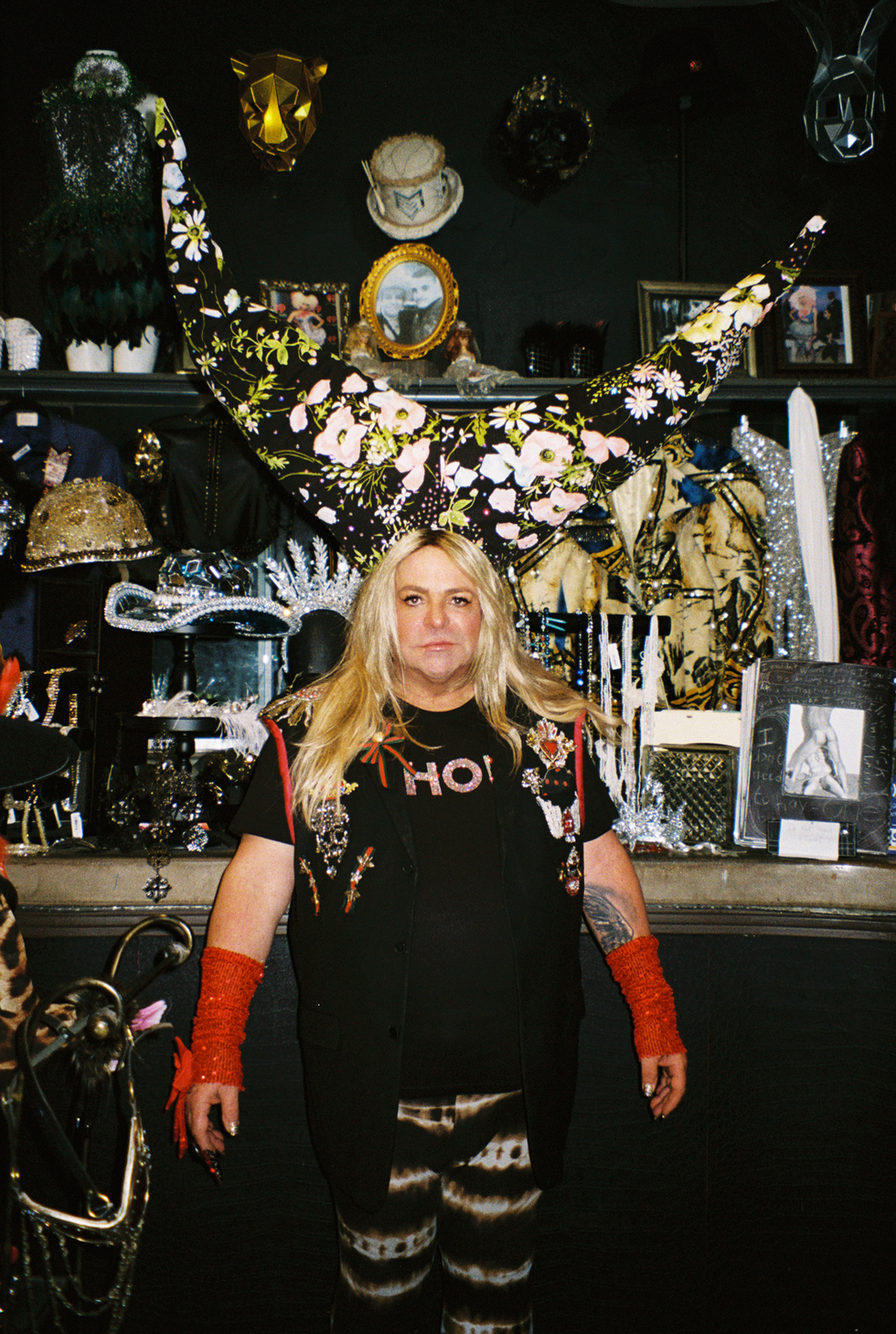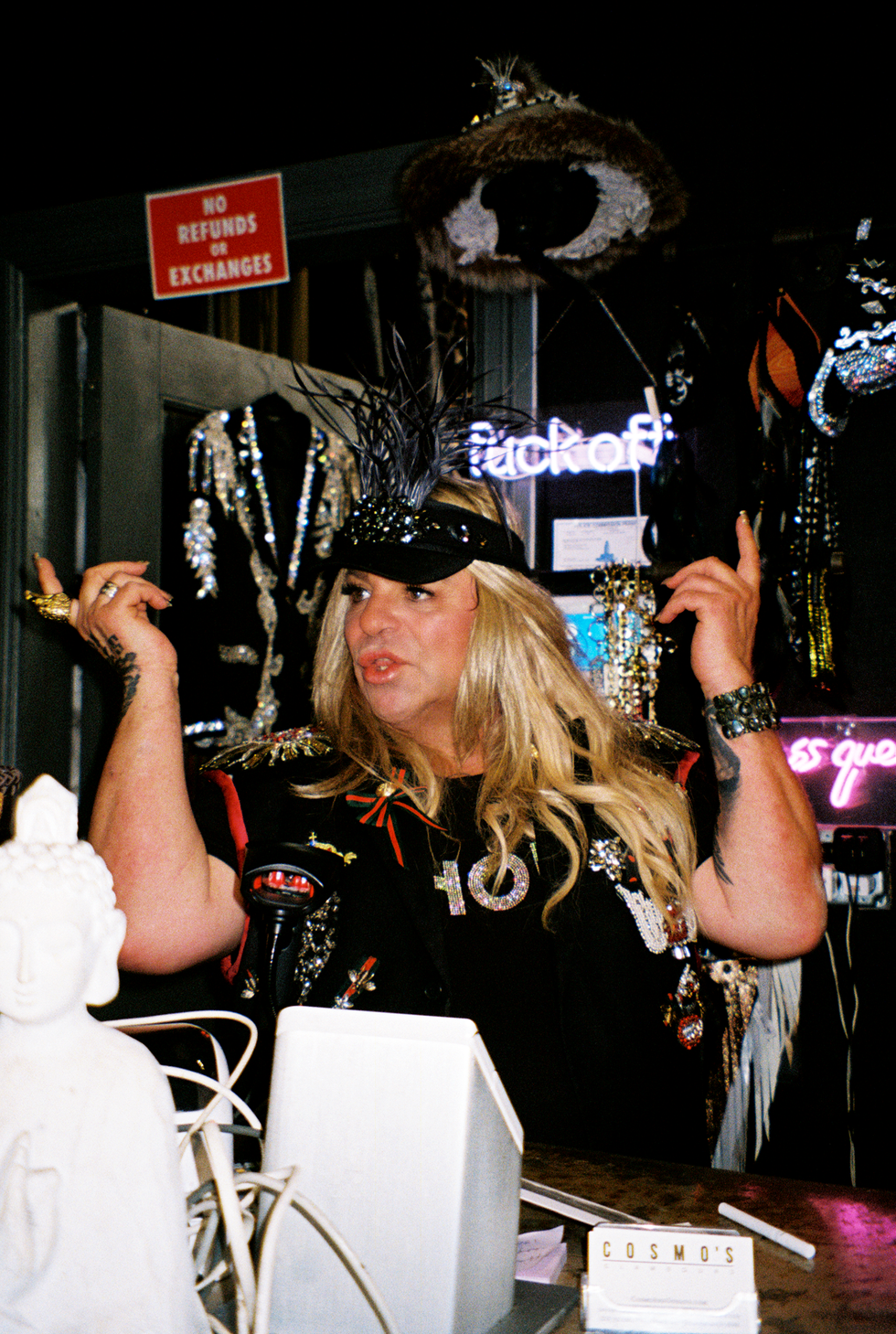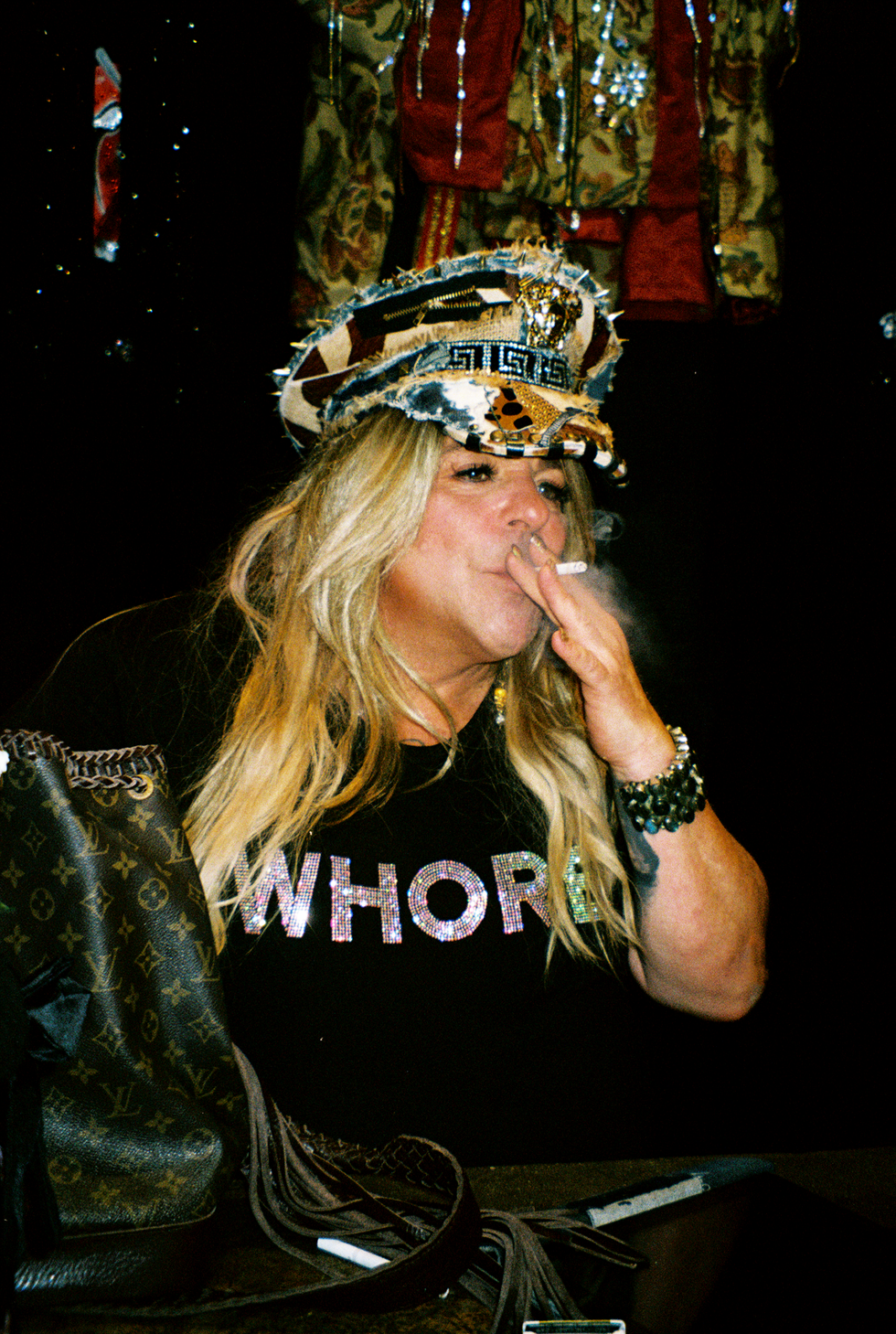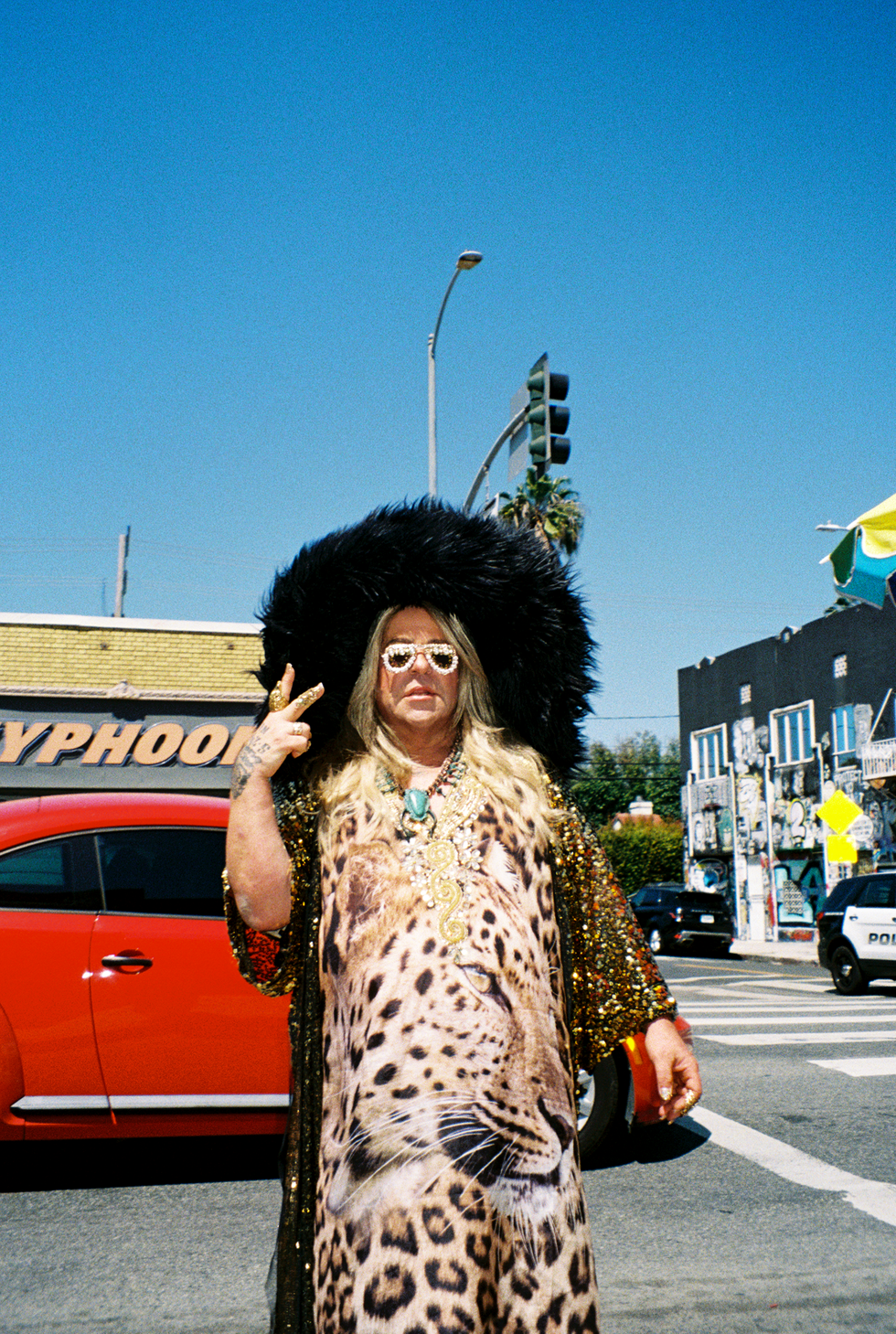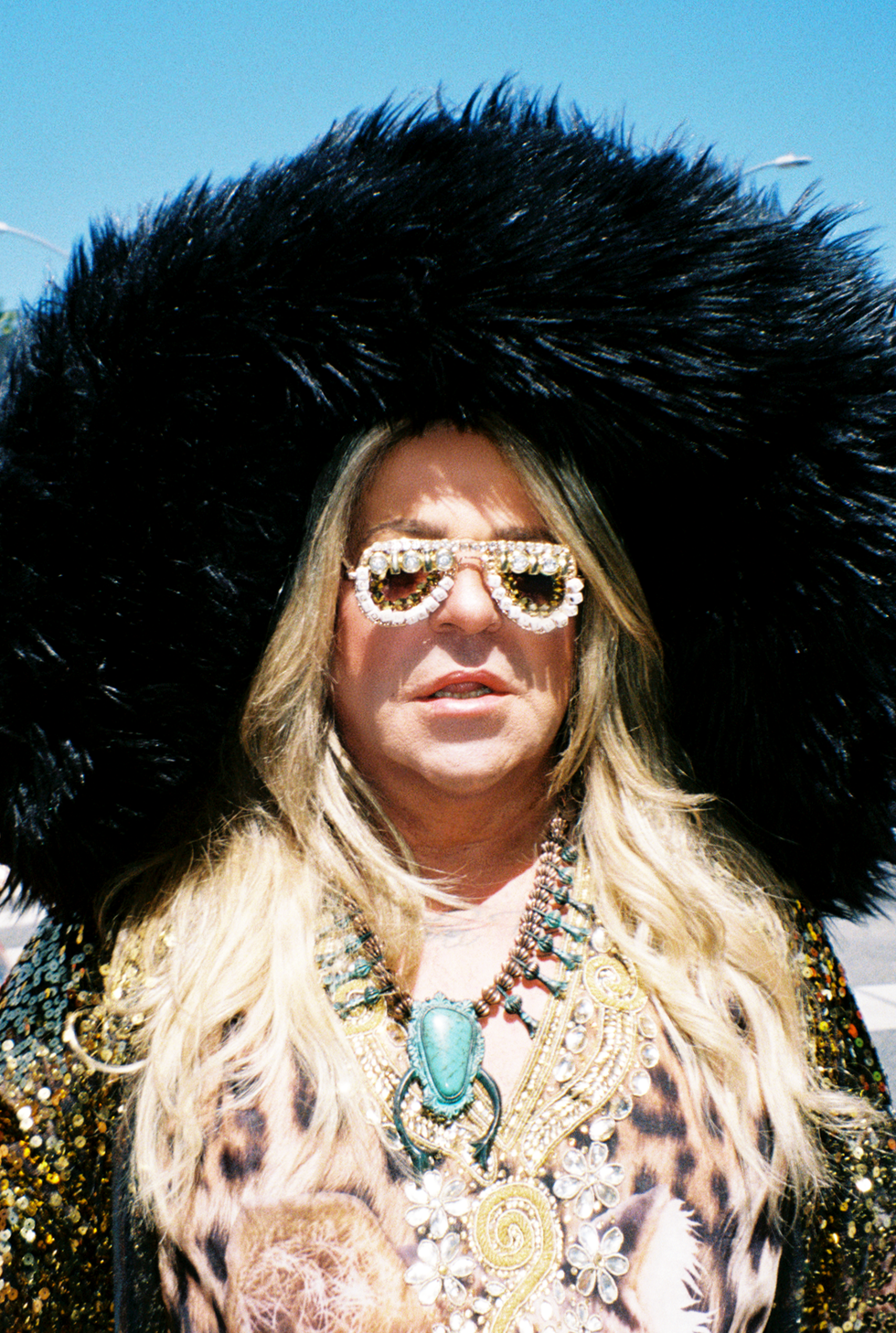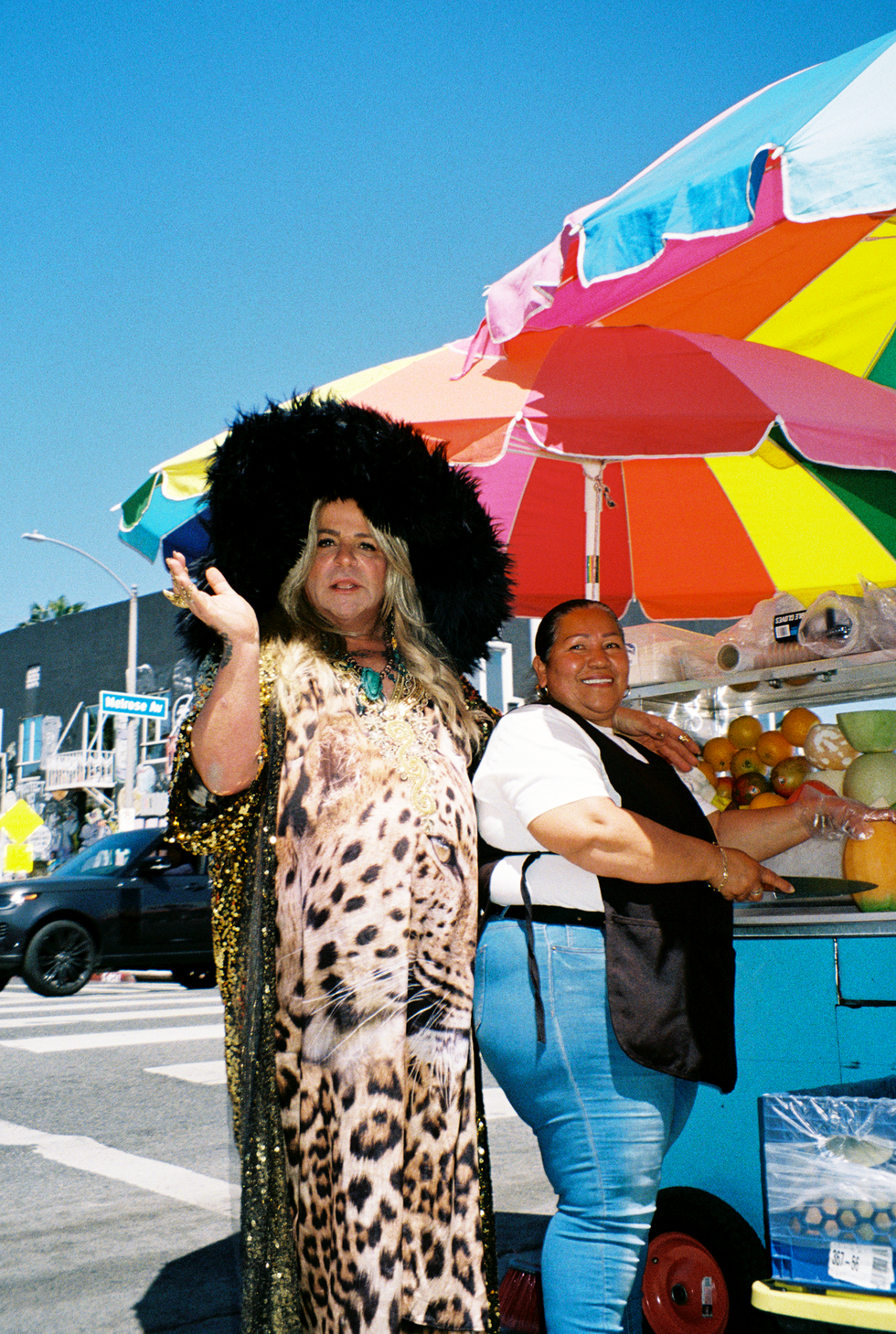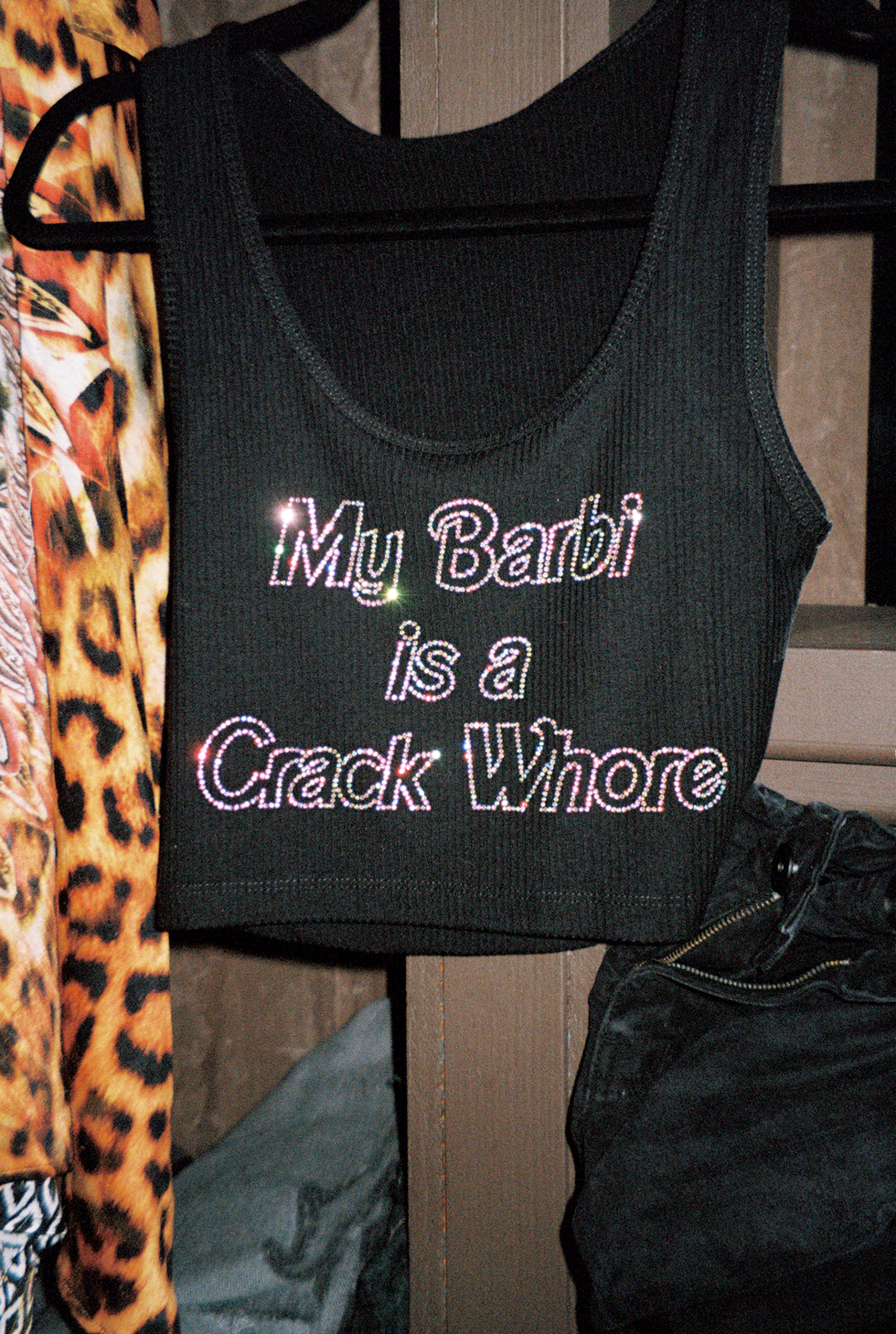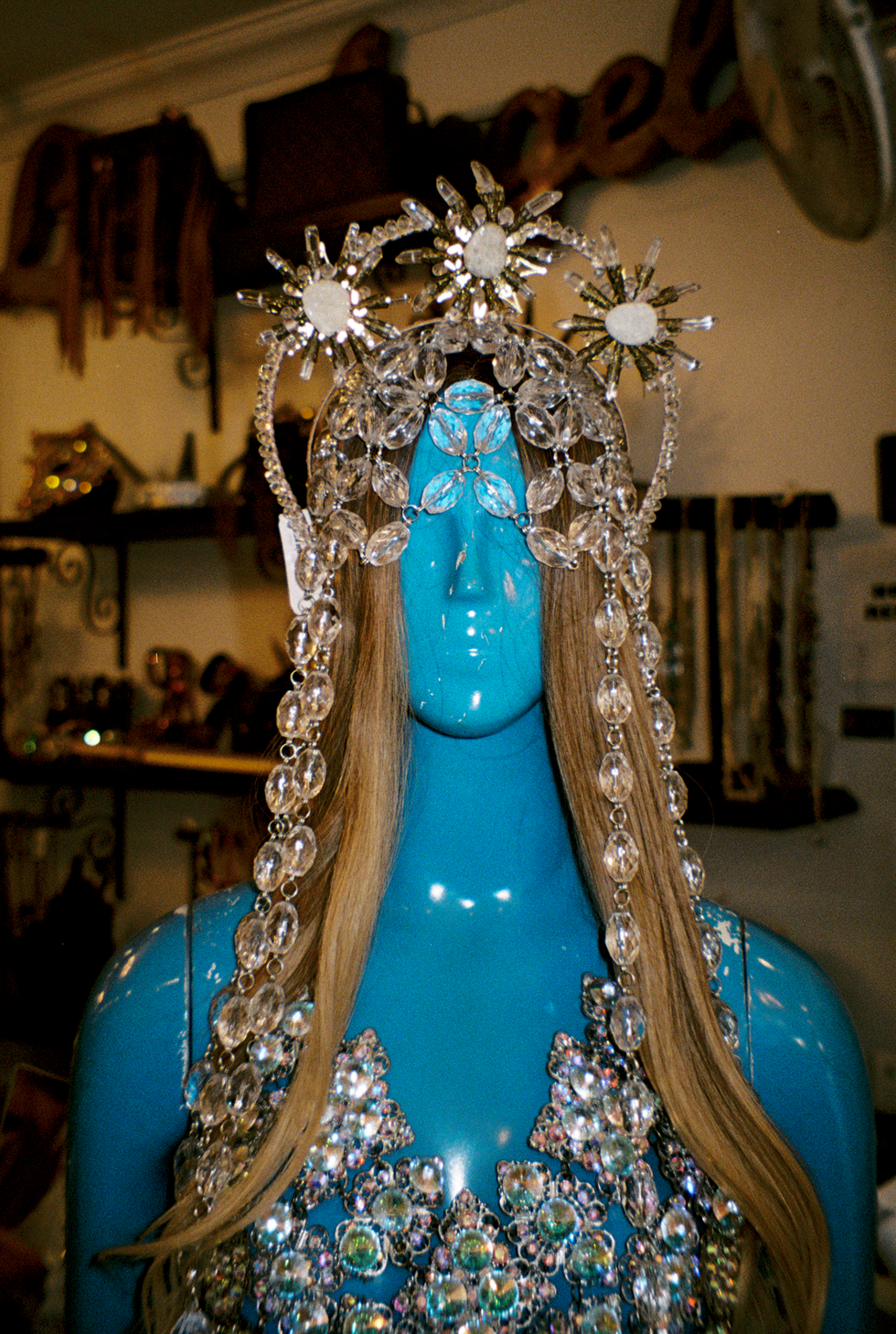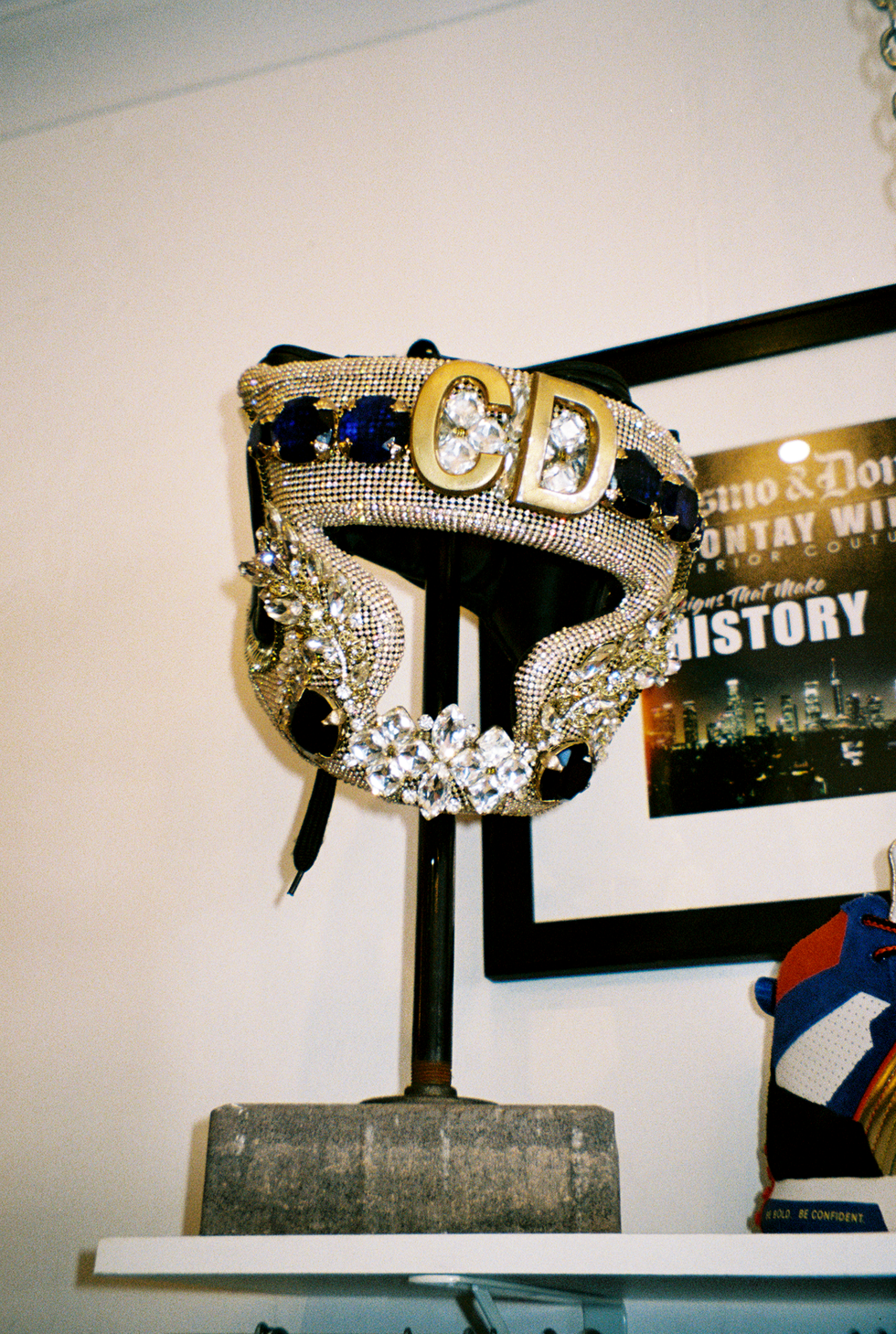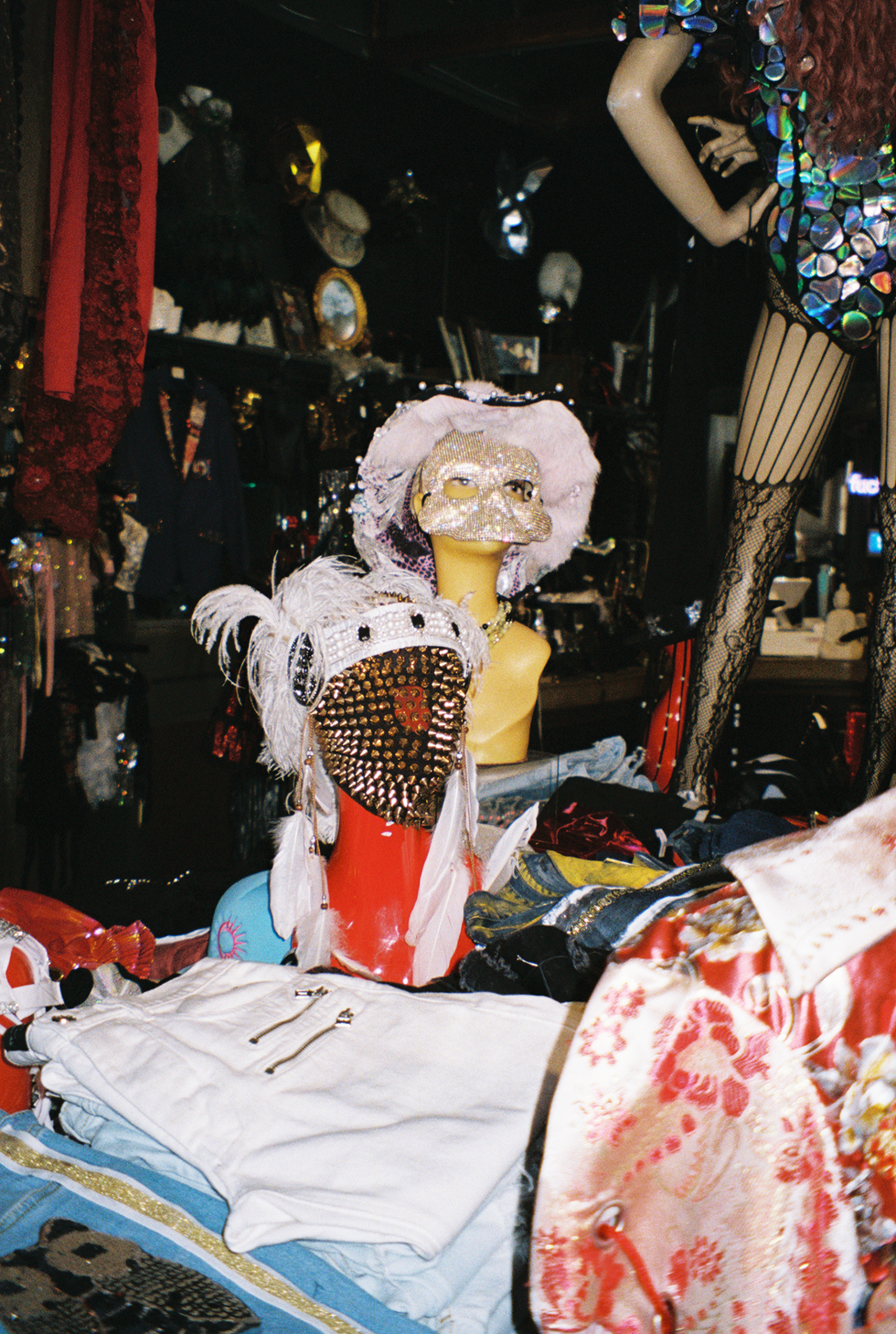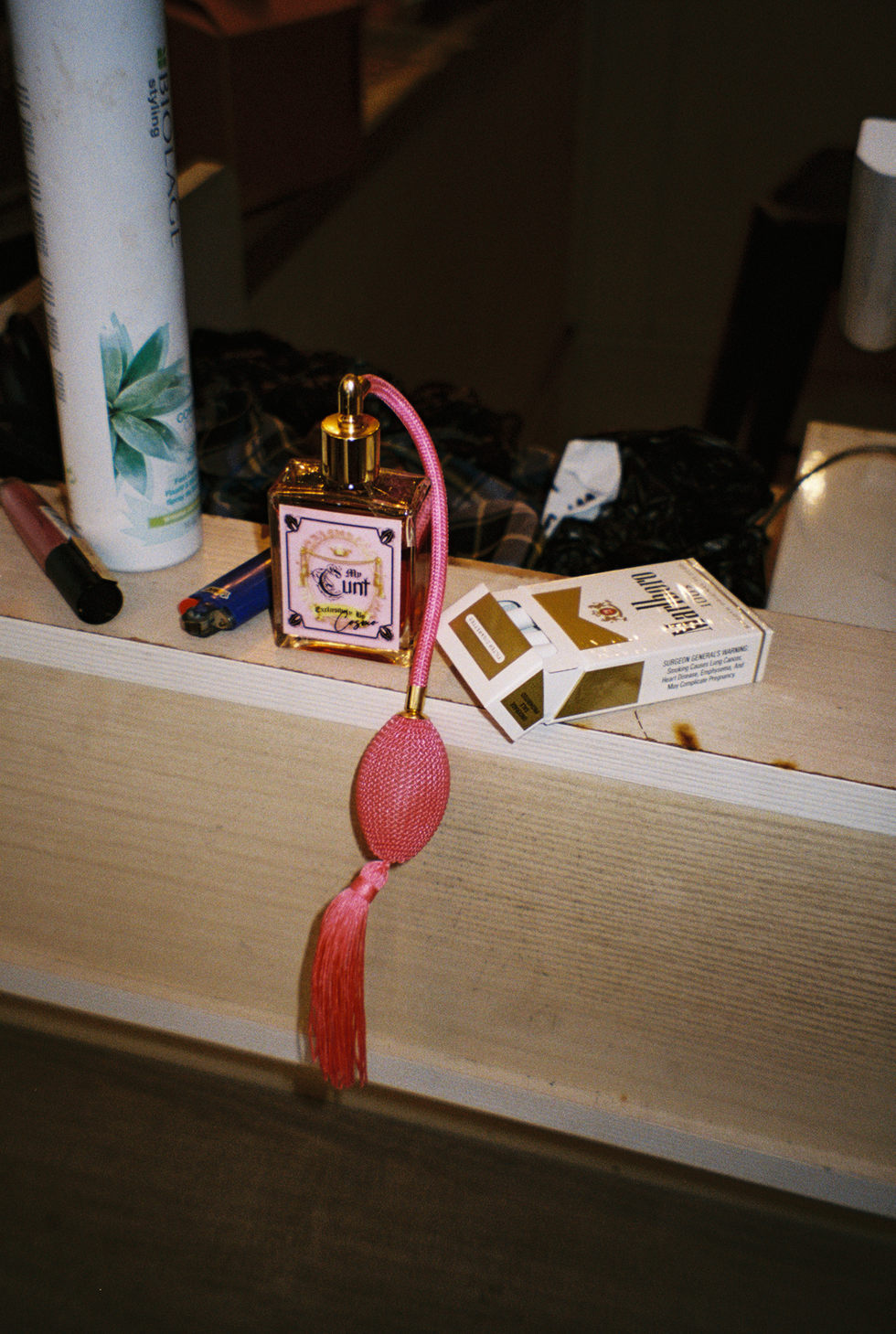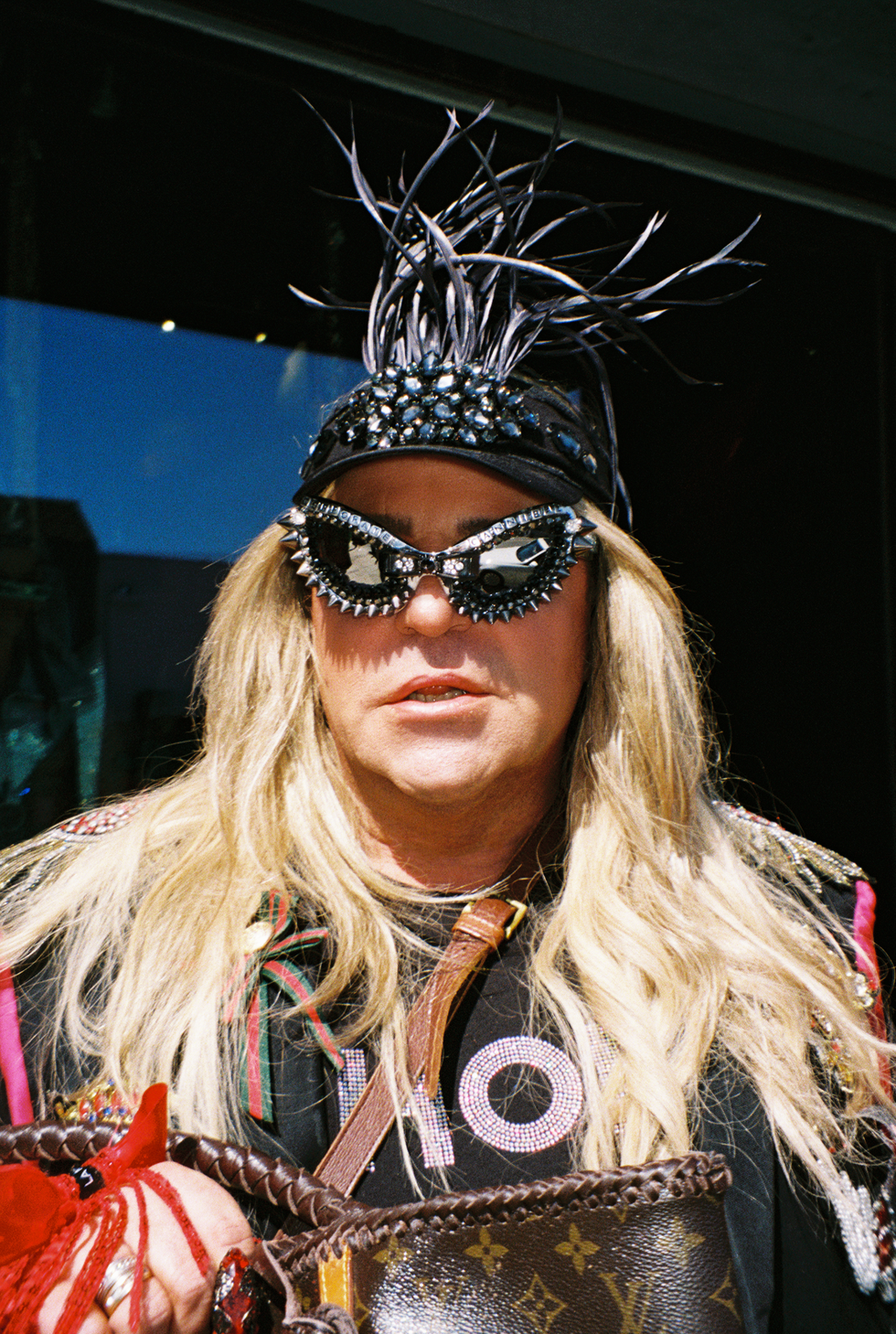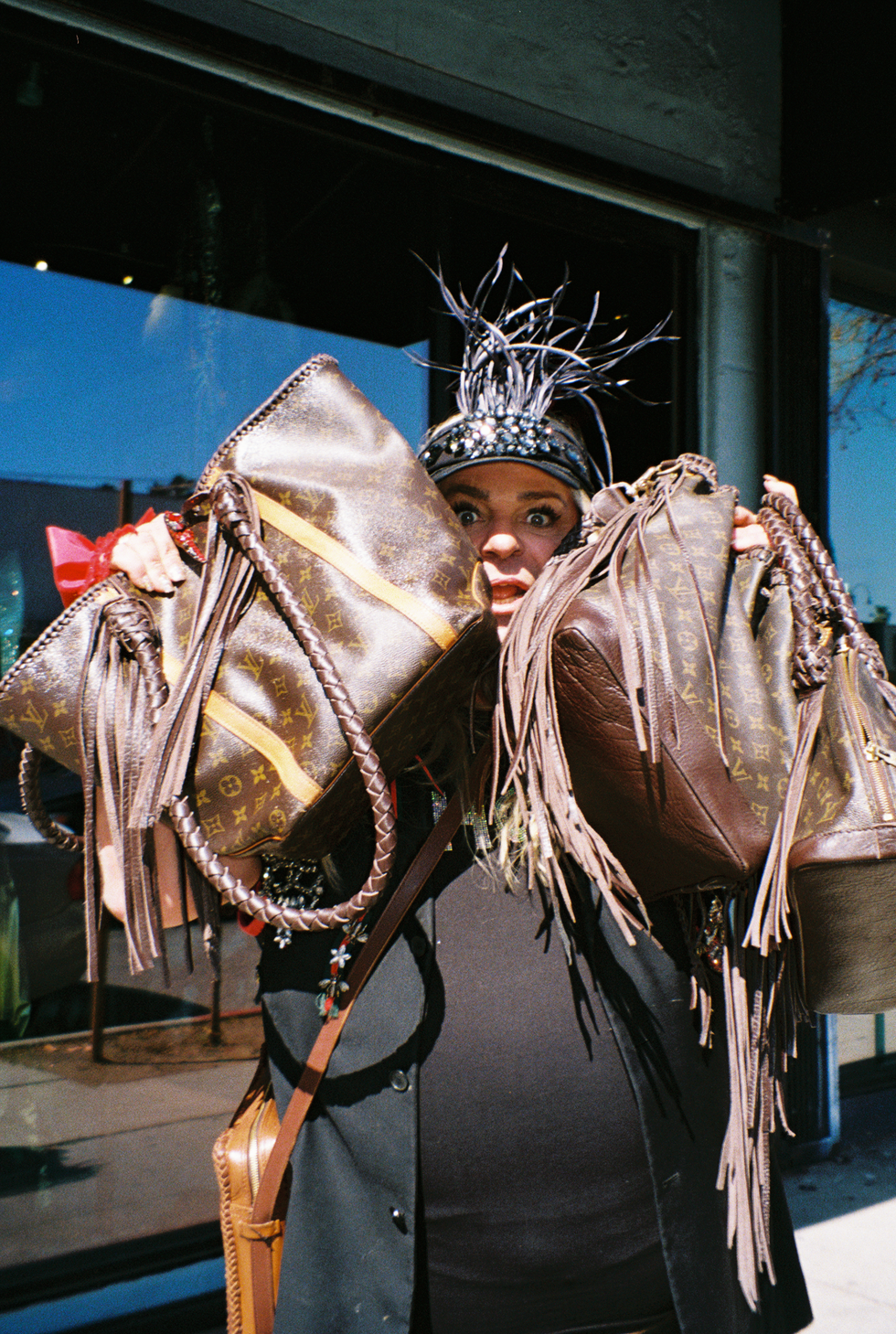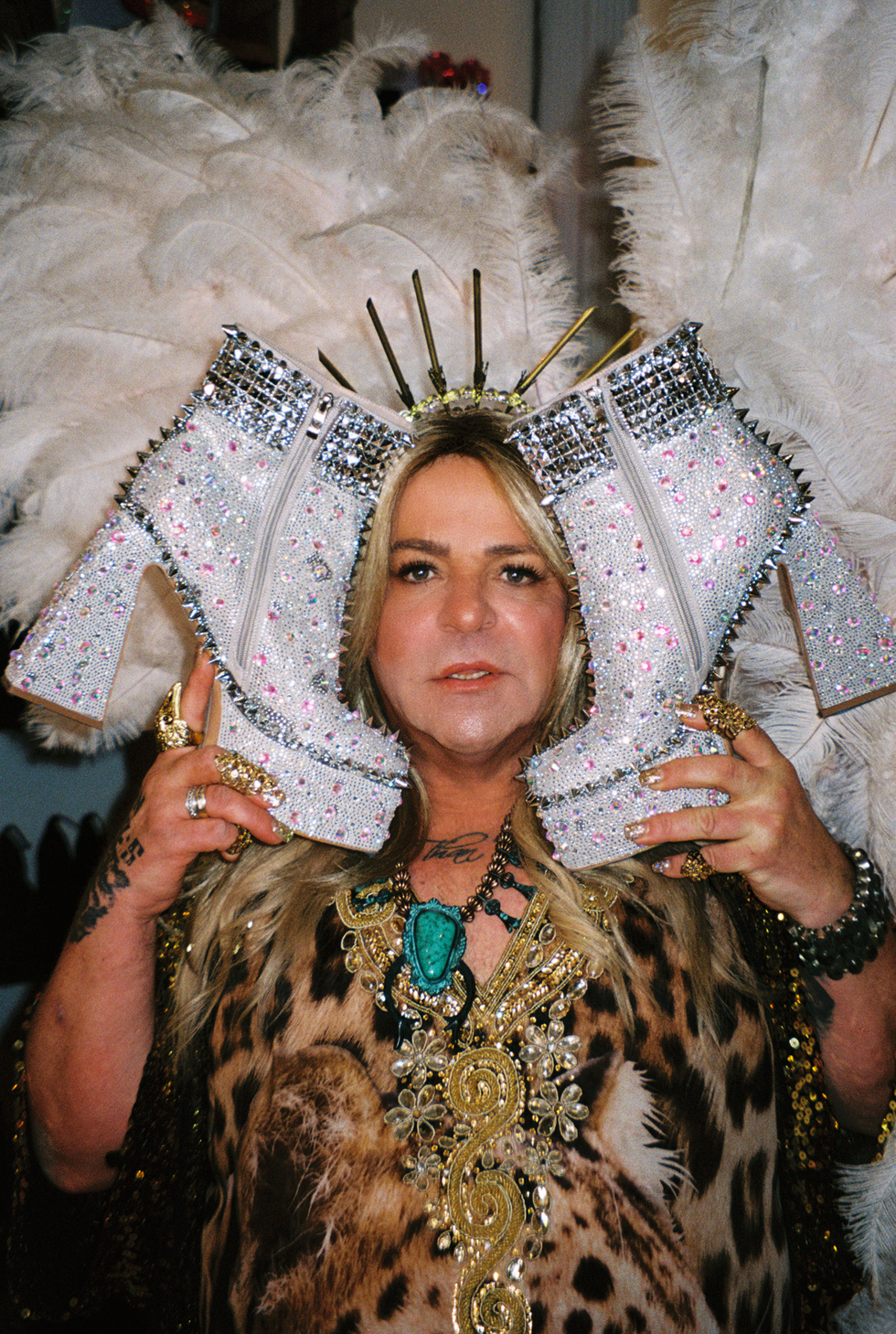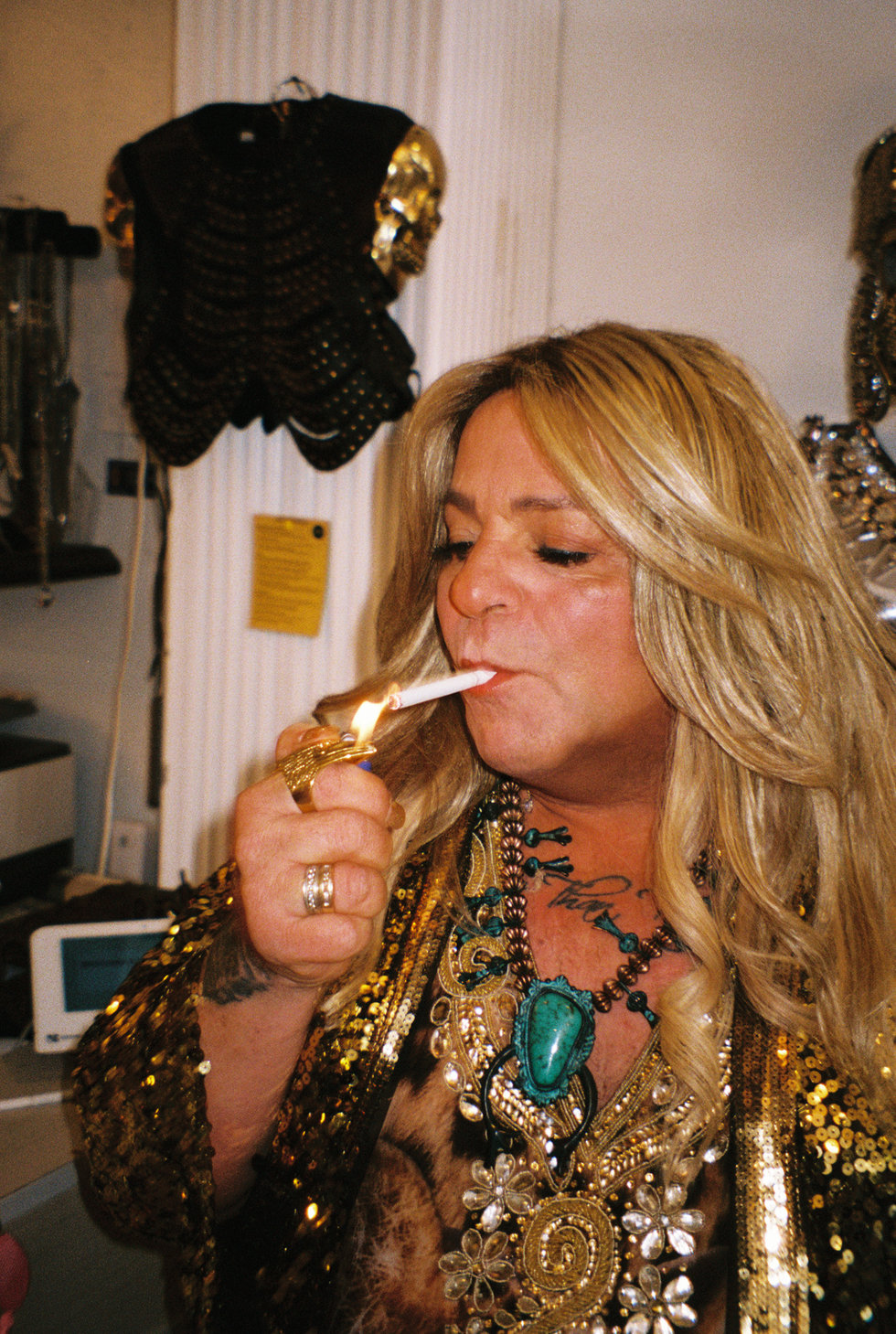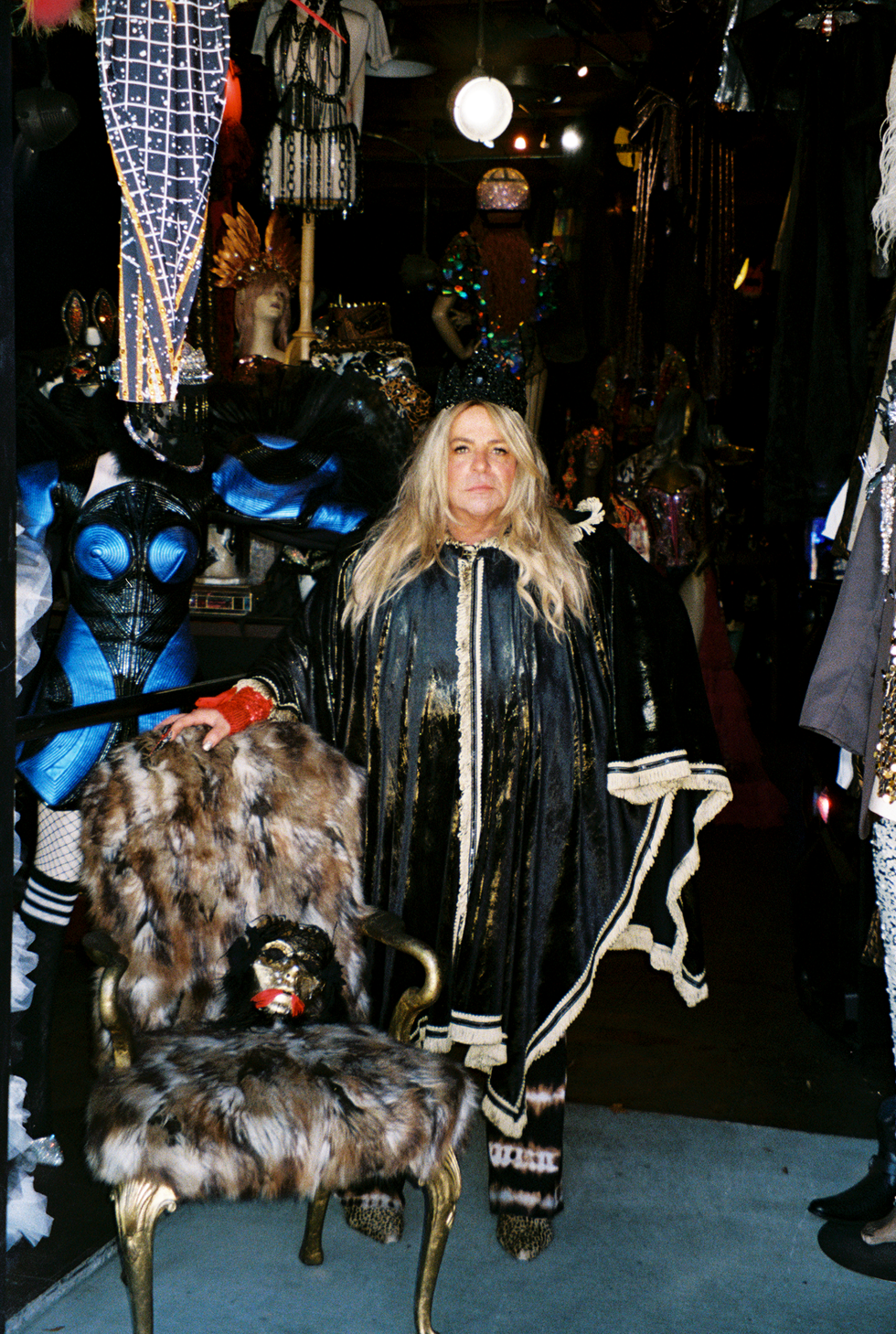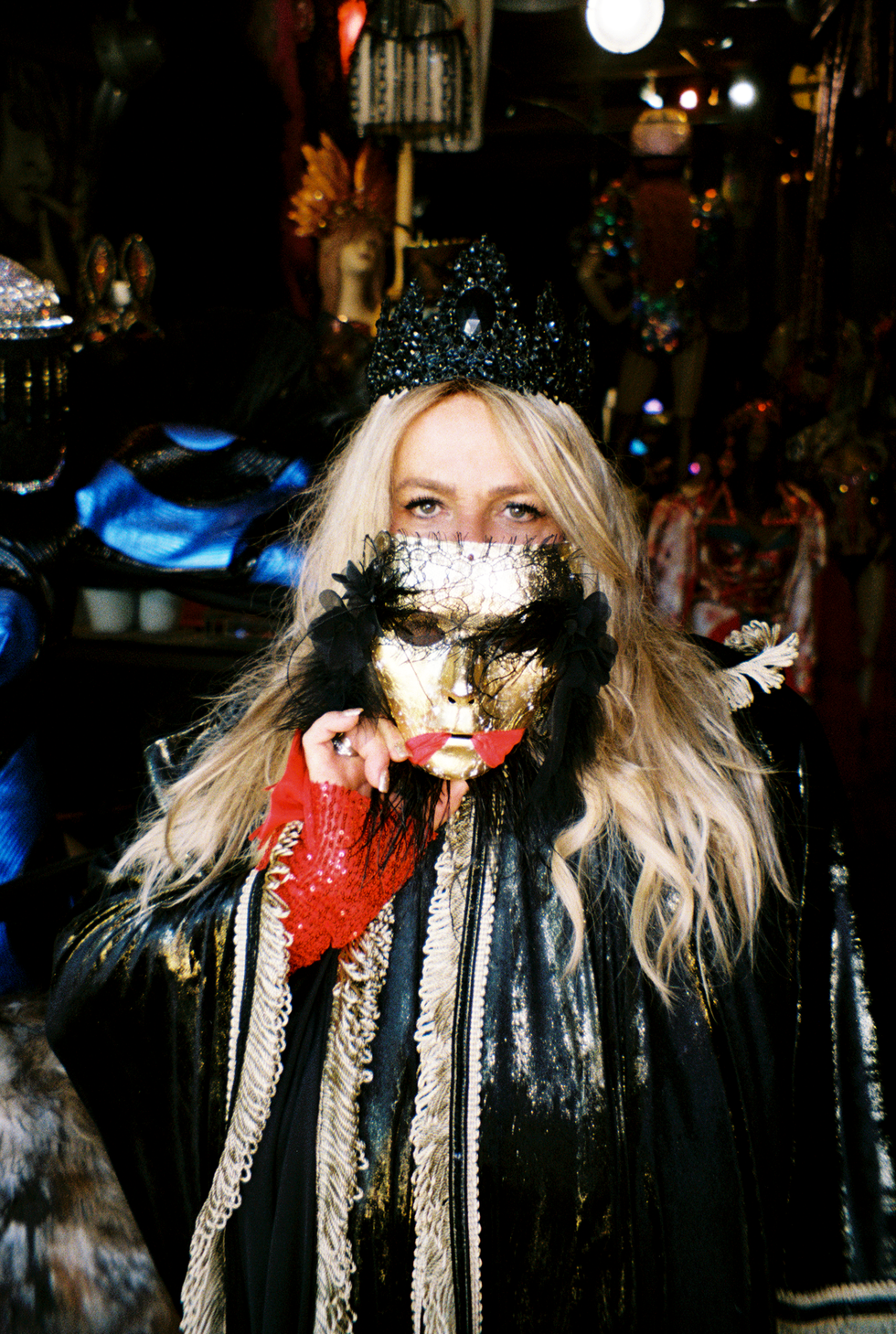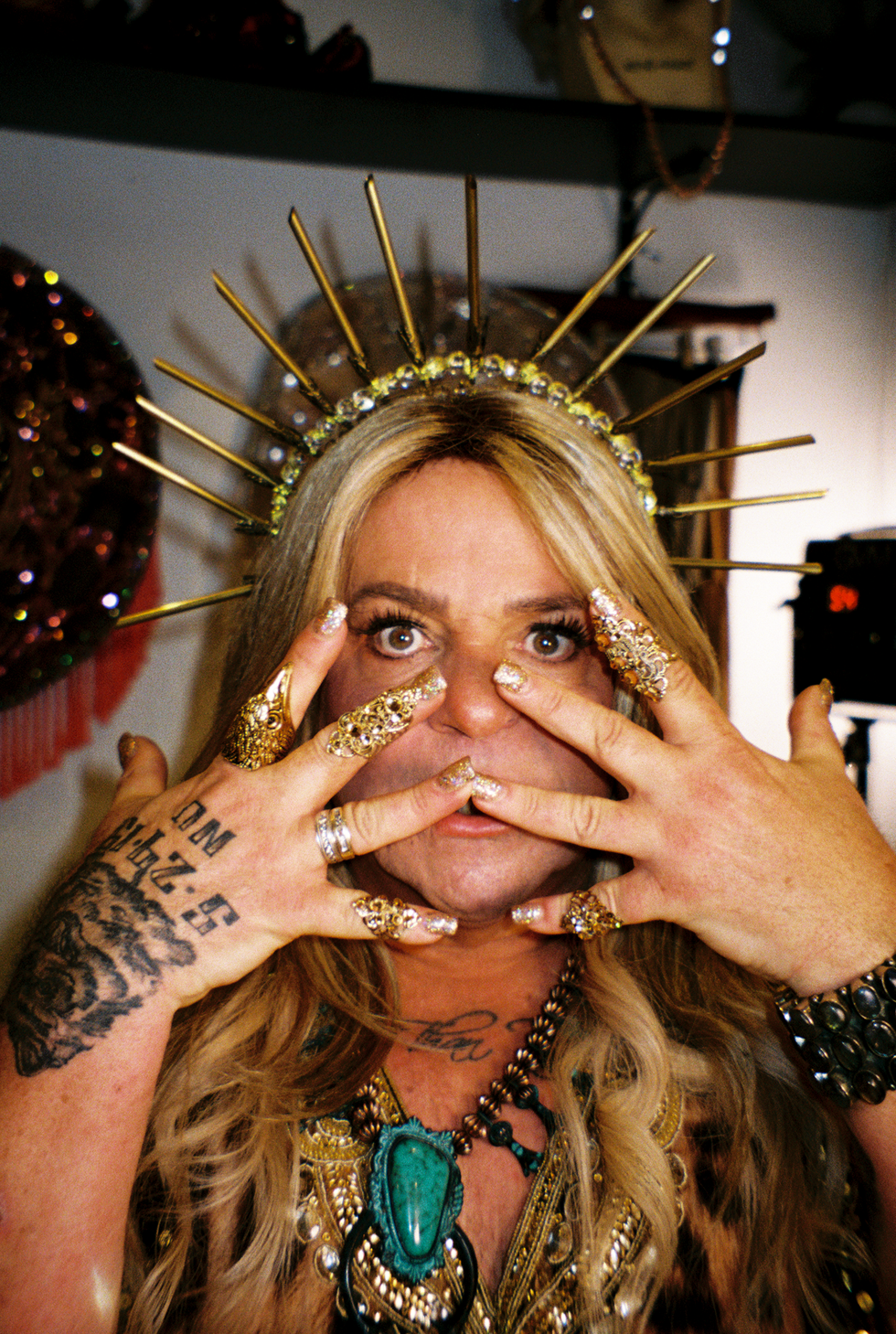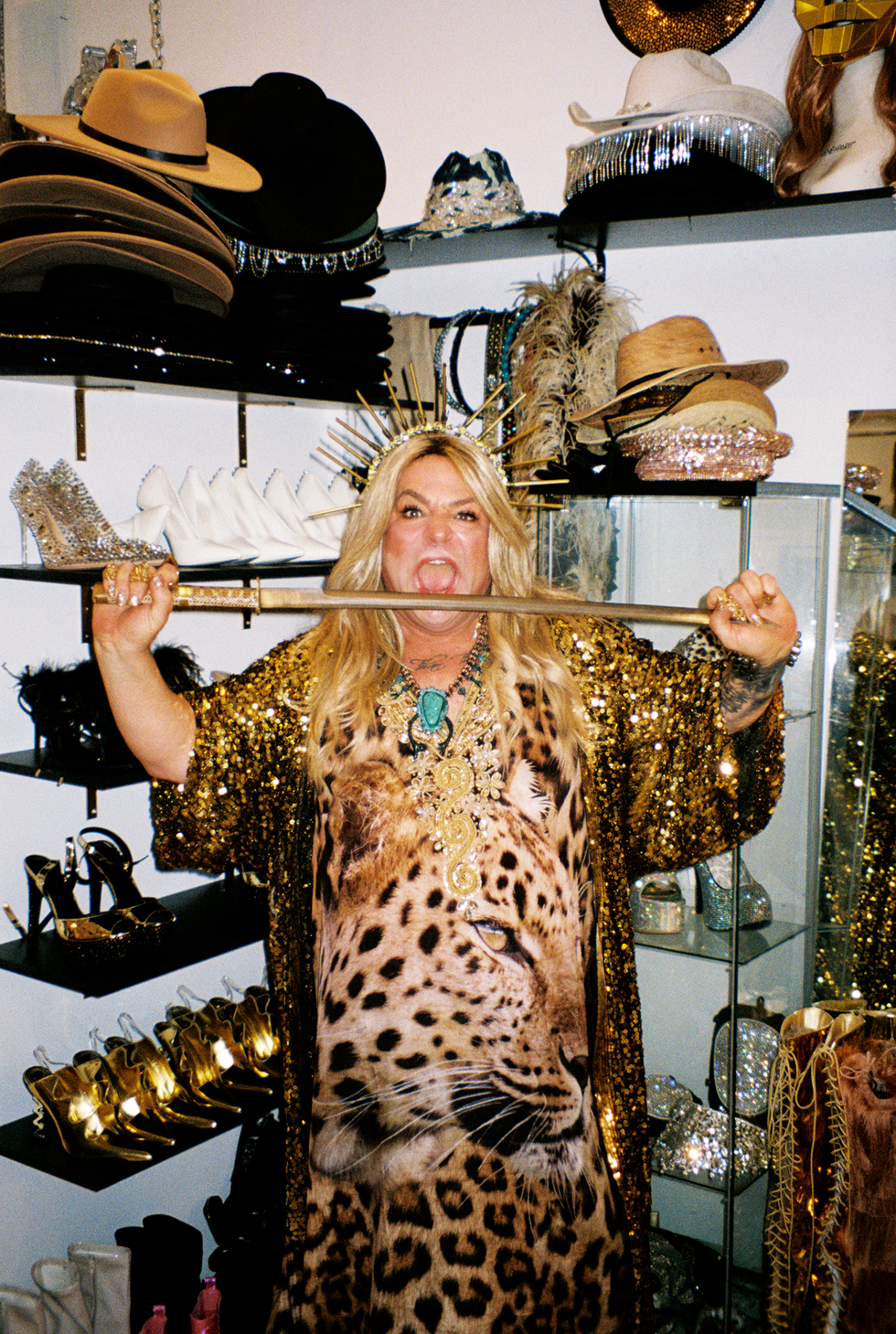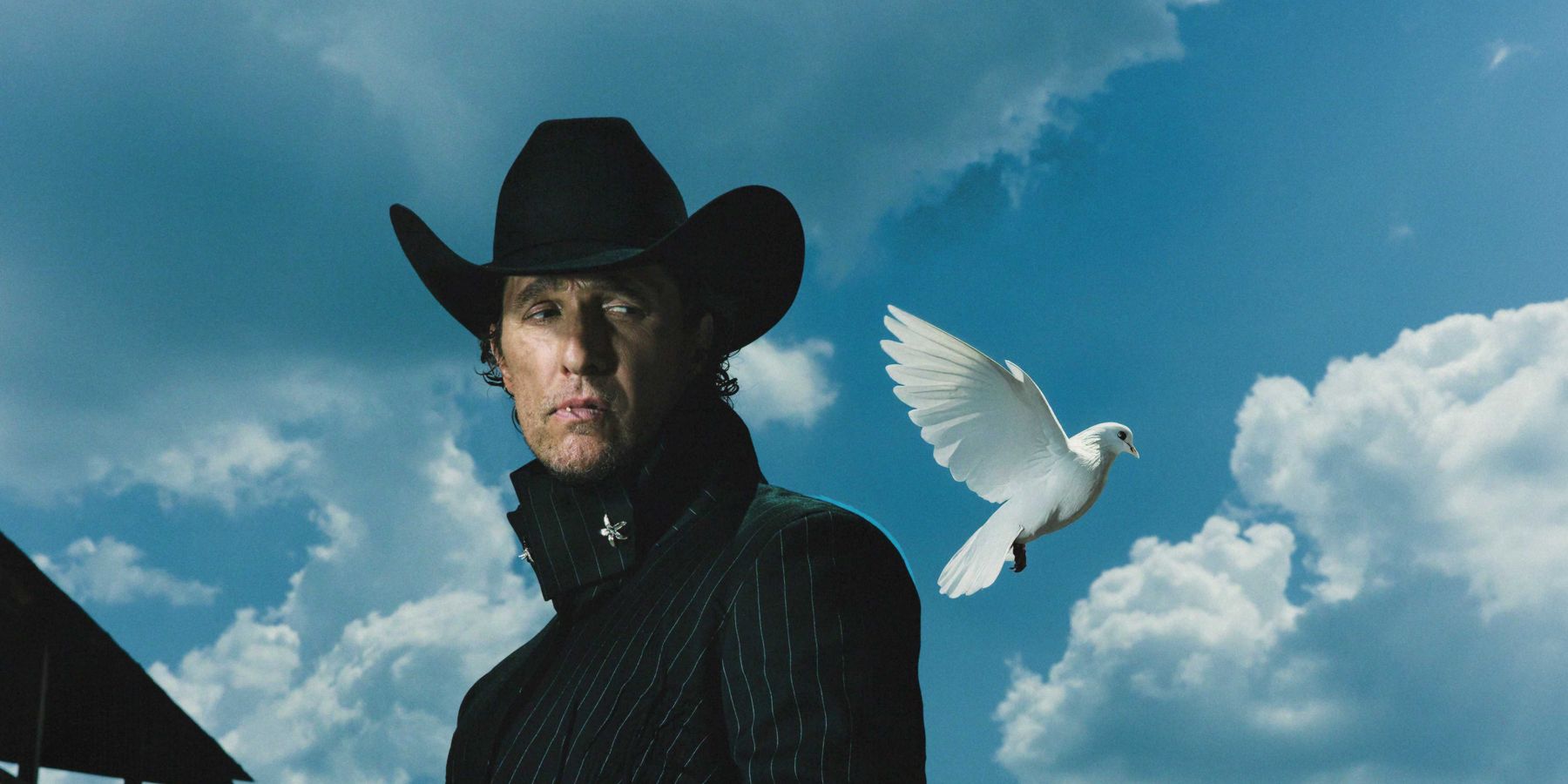
Inside the Queen of Melrose's Fashion Empire
Story by Joan Summers / Photography by Tyler Matthew Oyer
May 08, 2024
The Queen of Melrose (Cosmo Lombino) is holding court in her eponymous Melrose fashion haven, Cosmo & Donato.
While we settle in for our interview, Lombino's team buzzes around, primping her hair and makeup for an appearance later in the day at World of Wonder. The swarm litigates makeup and clothes, and whether the hair should be up or down or back or parted. Her collaborator and manager, Eugenia, takes me for a tour of the store while in the background, I hear Lombino inform the crew that the Queen needs to look like Tan Mom and isn’t bronzed up enough. I goggle at the cavalcade of sequins and fur and leather and color that explodes from every corner of the boutique, and feel immediately at home in the little slice of glamor Lombino and her business partner Donato have carved out on Melrose.
For most, Lombino crashed into their lives with an appearance on the buzzy YouTube channel, Soft White Underbelly. Others, like myself, would recognize the name if they’ve ever spent any amount of time with drag queens and nightlife fixtures in Los Angeles, who’ve all traipsed through her various boutiques for those elusive styles and sizes. Since breaking through on YouTube, though, Lombino has gone viral for a rant about parking outside Madonna’s arena tour, and for delectable gossip about the queen of pop and more shared with news outlets and magazines and YouTube channels clamoring to witness a glimpse of the queen’s seeming magic.
And that’s the thing, really: Cosmo, the Queen of Melrose, is pure magic. Her store is Wonderland, and I’m Alice, having just fallen through the looking glass into the clutches of the ever-fierce Queen of Hearts. I return from my trip around the way with Eugenia, and we settle in as Lombino puts a pause on diplomatic relations with the glam squad. She asks me, before we continue, if I like the hair up or down. Up, I say, always, and she compliments my own bangs. “I love good bangs, they’re hard to cut and hard to find.” High praise, and I hide my bashful smile behind my gas station coffee while she effortlessly segues into an anecdote about the Jehovah’s Witnesses her mom made meatballs for in the ‘80s. Of course gay people on the internet hang onto her every word; why wouldn’t they live for this?
For someone in the full tilt of a career renaissance, I ask Lombino if the attention has felt overwhelming. “Have you ever woken up and you felt like you're sentenced to another day? Drink five cups of coffee, have a cigarette and need a lap dance?” I laugh, and hold up the vape I pretended to quit a few weeks ago. “It's like a new value in my life, you know, waking up excited to do stuff like this, hair and makeup, doing interviews. It’s actually changed my whole life,” she says. After thirty-some-odd years giving makeovers to everyone who winds up in her store, she says: “It’s my turn, bitches, okay? Move over, I'm driving.” As for me: “When I get my hands on you, girl, and give you a makeover, we’re gonna be like lesbian lovers.”
I offhandedly remark that the way gay people call her mother on the internet is an interesting reflection of her need to make over others, or extend help to her immediate community, like employing fellow sober people in her stores. “I just found out recently I have codependency, which comes with addiction. And it really comes from my mom, because my mom used to take care of us no matter what. No matter what, she had our back.” That codependency has created problems for her, however. “ I just encountered something like that last week in my store. An employee that I knew that should have been gone a while ago, but was like family to me. If you work for me for so long, like five years, you're family. Like a tattoo, you're not gonna get rid of me. It was a very hard lesson to learn.”
Beyond TikTok, beyond the viral clips, beyond the chatter about Madonna gossip, Lombino is a hustler. Literally. “In the ‘80s, in New York, I used to go to the Tunnel and the Ice Palace. I was a hustle dancer, I used to hustle.” When she’s not slinging custom-made clothing for Coachella artists and the Burning Man-bound, she’s sourcing up-and-coming designers and building out her self-described “empire” on Melrose. “Well, there's a few designers that I have in my store that are the LA underbelly designers, the underground fashion world revealed,” she says. Among them are her own designs, under the label “Cosmo & Donato.” “My website doesn’t do it justice, that’s the magic of the store,” she says. “Things I can’t duplicate, so we don’t put them on there.” She picks up a rhinestone-encrusted cap. “This is so like, Sex Pistols!” She tilts it to one side, just so, like the infamous photo of Madonna in the leather riding cap with the cigarette, by Patrick Demarchelier. “You could wear this to the grocery store!” Or, in my own experience, to pick up taquitos and a cherry slurpee from 7-11. “Here in LA, you don’t need a reason to be fabulous. It’s such a fashion show. You go to the clubs here, people really do it. When I go to New York, I don’t see that in New York anymore. And guess what New Yorkers, that has got to change. The Queen of Melrose says to change and get with the program.”
On the topic of those stores, she has three on Melrose: Cosmo & Donato, Cosmo’s Glam Squad and Fashion Whore. Donato, her business partner, pops his head into the room, and reminds Cosmo to mention their upcoming collaboration with Wild Muse, in Area 15 in Las Vegas. “They need the Queen of Melrose to come help turn it around over there,” he says. I joke that Cosmo needs her own Tabatha's Salon Takeover, except for fashion boutiques and festival specialty shops. Cosmo’s eyes light up, and she eagerly turns to her business partner, and back to me. “We’ll have to get a sizzle reel!”
Her energy, her hustle, is pure momentum. In our conversation, and in life, Lombino blazes ahead. From running around the Village in its heyday to partying with Rick James at Carlos and Charlie’s to the dwindling respect amongst fashion consumers for craftsmanship and artistry, I recognize her restlessness, her passion, in my own recovery journey. It’s the hustle that got her sober, as she tells it, got her this life back after she rock bottomed and lost everything. “We are really not guaranteed another day, you know what I mean?” I nod. “This disease wants me dead, or it wants me to be alive and miserable.”
Misery’s not in stock at Cosmo & Donato. “This is my purpose, sending a message of sobriety and hope,” she intones with an intense surety. And gossip, and wisdom and all the glitter and glamor one could ever buy.
See PAPER’s shoot with the Queen of Melrose, and our full conversation, which covered just about everything and then some, below.
I’m in recovery myself from alcoholism–
Oh, congratulations!
Just hit four years. You’ve talked about how, when you were going through the recovery process, there was a moment when you got everything that you wanted back, and it made recovery harder for you. Now that you're going through this renaissance in your life, how are you approaching those lessons again?
At that time, I had no foundation. I had to get a foundation. I was staying sober for the things I got back, you know what I mean? Boyfriends, and the store, and I thought that could keep me sober. But it means nothing when you don’t have a foundation. That’s when I relapsed, and I had to go back to rehab, back to the beginning, and lose everything. I started establishing on basically doing the work. Working the steps. But sometimes, you don’t want to do it. Sometimes, it’s like walking on hot coals.
"Whatever I can do to help somebody feel comfortable in their own skin, I’ll do it."
I feel like it’s a lesson many of us have to learn. I got sober to save a relationship that was doomed anyway, and when it finally ended, it’s like, what am I supposed to do now? What does sobriety mean to me now? I just have to get up and do this for myself every day for the rest of my life?
I think it was just so many years of practice, you know what I mean? We are really not guaranteed another day. I’ve got a disease that gets progressively worse, and this disease wants me dead, or it wants me to be alive and miserable. It took me years, and I am eight years sober now, and I’m 60 years old. For the young generation, the drugs are so potent out there, so intense. I do see the suffering, because it’s brutal out there. It’s brutal. But it’s a beautiful thing to see younger people in the meetings, because I grew up with people getting sober later.
On the topic of growing up, I read the interview you did with Dazed. In it, you were asked your pronouns, and you sort of brushed off the question, and told people to “call me queen.” You’ve also talked about growing up feeling like a girl, or that you were going to marry a man, even despite your mom’s protests. What did that feel like, as a kid?
Before, I was confused. Growing up, I did think that — I don’t know where it came from — it was just natural. It wasn’t a decision I made. I thought it was perfectly okay that a man can marry a man. I’m like, “Mommy, I’m going to marry Johnny Osman,” or Davy Jones, from The Monkees. It was normal to me. If I wanted to marry a man, I had every right to, you know what I mean? I grew up in the ‘70s, where it was Studio 54, and it was gay people, straight people, everybody in this one club, and everybody got along. It was okay to be with a man, it was okay to be with a woman. Especially in New York, in that era. I never felt like it was stigmatized, except when I was younger, and my mother converted to a Jehovah's Witness. Before she was a devout Catholic, then these people came to our house, and she converted.
She let them inside?
Yes, and she made them meatballs, and guess what? She converted. So now I’m eight years old. You can’t be gay, you can’t touch yourself. No more birthdays. No more Christmas. So my mother tried that for a little while, but my father was in the mob, and eventually she was like, fuck this.
I could see that not working for the lifestyle.
I would be standing at the table and going, so the Bible also says the truth shall set you free, and I’m telling you the truth. It’s like, I was never in the closet! I was storming out.
It’s interesting to hear you say that, though, because sometimes, younger people forget that for as many things have changed, things have also stayed the same in other ways. These experiences connect us across generations.
Because we do need that connection! We need that. A few years ago, it was like, trans people got this right, and this right, and that right. We were just, like, so strong and where we wanted it to be. And now they want it back. It’s primitive again. It has young people in fear. Whatever I can do to help somebody feel comfortable in their own skin, I’ll do it.
You talk often of growing up in New York City, and then moving to LA to partying at various hotspots. Did you find any similarities with the club scenes at that time, or did they feel far away from each other?
When I came out here it was all nightclubs. The way New York was popping off, LA was also popping off. In the ‘80s, in New York, I used to go to the Tunnel and the Ice Palace. I was a hustle dancer, and I used to hustle. I went to the West Coast, and it was way behind with a lot of things, but they did have a very strong club scene, like the Odyssey. I would go there and it would be like, was what’s her name, on Family? Buddy.
Oh, Kristy McNichol.
Yes, so I walked in this club, and not only her, but I saw the old movie stars, I saw the young movie stars that were gay. I saw these celebrities that I grew up watching on TV, and they’re in this club also.
You mentioned Carlos and Charlie’s in the Soft White Underbelly interview. It was funny, because another LA fixture that I recently spoke with, Delta Work, brought it up as the primo place to go after seeing a show at La Cage, or the like. Do you have any memories you could share of the spot?
First of all, La Cage? They should have never, ever closed that club. It was like, everybody went there. My mom and dad on a Friday night would go there and have dinner. It was very shi-shi-foo-foo-la-la. You would get the best drag show you ever got, and like, the Madonna impersonator would look like Madonna. It was Viva, who I remember.
Delta also mentioned her, funny enough.
All these places were there for me to feel comfortable growing up, because not only was it the gay club, but the Queen of England went there, you know? Carlos and Charlie’s was more of a straight club, but it was like Danny Terrio from Dance Fever, it was Tony Danza, it was Rick James, all those people partying. Like I told you, my father was in the mob, he was very well connected, and I was 17, and allowed to go to these places because of his connections. I never felt like I was missing out.
You’ve been an LA fixture, and on Melrose, for what, 30 years? In one way or another. What changes have you seen in the neighborhood in that time?
I’ve been through a lot. I remember the recession, where everybody was losing their houses in LA. The money was so bad, but we always got by on Melrose because it was like, “Okay, you’re losing your home, but in LA, you gotta look good.” My store got even busier at that time, I was very fortunate. People would always come to Melrose, and all the new artists would come to Melrose no matter what, because there was always amazing clothing here that you couldn’t find in the mall. I’m telling you, though, that of all years, now it’s challenging. It’s very rare that a clothing store lasts that long. I've been here for 30 years. It’s kind of unheard of, you know?
Like, how many queens have come into Shoe Whore, to get a heel?
Well, I made it a safe haven. When I came to Melrose, it felt like my safe haven. I was like, what am I going to do in LA? Where am I gonna fit in? And then my father took me shopping at a store on Melrose, he bought me this outrageous outfit, and I was like: That’s where I’m going to work.
"The straight guys don’t give a fuck. He’s hot, he’s going to the gym, he’s tweezing his eyebrows, he’s waxing his ass."
We’ve had this moment in fashion for a long time, where everybody wanted the New York look, and it’s what people shopped for. In the last few years though, that quintessential LA look you embody has come back around. With the artists you style, and the ethos your stores represent about LA fashion, how has it been to see the style resurgence in popular culture?
Honestly, to me, it never left. It’s always been here. I grew up in New York when everybody was fashionable in the ‘80s. Everybody needed to look like Madonna, like David Bowie, but everybody had the look. Now you go to New York and it saddens me, because all these specialty stores I grew up with, they’re all gone. It feels like New York doesn’t have anything anymore, you know what I mean?
Queen of Melrose declares war on New York fashion!
You can see the demographic changed. It got either very techie, where they’re just wearing like, Ralph Lauren, or they’re dressing down. When I was there it was a fashion show. What’s good about LA? The weather’s great here. It’s always been a fashion show. In New York, people come in and go, “Oh, I can’t wear that, I can’t wear that.” They’re so primitive, when they’re like, “Where am I going to wear it?” You’re gonna wear it to the fucking grocery store, what do you mean? Like, it’s OK to be fashionable, you know? What’s going on here, guys, because I grew up in New York when it was a whole different animal. Now, I would love to go back and open a store there. The kids will get it. There’s still club kids there. New York’s kind of lost its zest. I go back and I’m like, where’s The Village? It’s not there anymore, where all the clothing would be. They’re like, it’s in Brooklyn. It’s in Williamsburg. I go to Williamsburg and I’m like, this is not The Village. These are expensive thrift stores. It says they kind of don’t have a clue, which saddens me. I stay away from New York a lot.
LA is still a place that, no matter how much it’s changed, you can still wear those bedazzled caps you sell at your store to the Gelson’s on Santa Monica, in WeHo, at 2 PM on a Wednesday.
LA is where the straight guy, not just the gay guy, is so hot, and he wants to look good, and he’s wearing the most flamboyant outfit, because he’s so sure of himself. I mean, basically, fashion was always more comfortable out here. All walks of life out here, where in New York, it’s like I need a reason to wear this wherever. It’s like it went back and got primitive again. Hopefully, we can open a store in New York.
You mentioned straight guys, and there’s always a lot of talk these days about straight guys “dressing gay.” Have you felt like that has been something you’ve seen for yourself, or have your customers that are heterosexual always wanted to push the envelope with their style?
I’ve seen it? I created it!
Speak your truth, sister!
I created it. Like, so many rock bands were dressing with baggy clothes, you know? I’m like, where are the tight pants? You gotta show your cookies! I am the queen responsible for getting these gorgeous men, and a lot of them are bisexual, or pan, or whatever, but the “straight” rock and roll guy, into sexy-ass clothes. If you go to West Hollywood, a lot of the gay people there have great fashion sense. But a lot of them shop at Gap, and they want to look straight. It’s weird. They see me wearing bell bottoms and they’re like, "Oh my god?" I can tell they want to live vicariously through me. But there is still fear going on. The straight guys don’t give a fuck. He’s hot, he’s going to the gym, he’s tweezing his eyebrows, he’s waxing his ass. He will wear the most fashionable things. That’s the customer I get.
Queen of Melrose needs to start a crusade on gay guys that wear tank tops and shorts to the club. We need you to start a war on them, get them back in line.
They need a reason, like the White Party. The Gay Pride Parade. Like, you don’t need a reason, just be gay. It’s okay to be gay. If you want to be fashionable, wear some glitter, but this new breed, there’s a stigma attached, everybody, the whole world, is in fucking fear. I’m like, so tired of it.
I’m curious where your sense of style comes from, because you talk about growing up in New York, and you’ve also been in LA for so long, and you’ve really crafted this high-glam, very gay approach to fashion.
It’s a combination. Growing up in Harlem, it was all the pimps, right? They had the baddest clothes, the baddest cars, even the prostitutes. The prostitute was the hottest girl in the neighborhood. New York had a strong sense of fashion and it happened in those neighborhoods. My mother’s sister was also very fashionable, she’s like a fashion model, and the other was more conservative, more Chanel. I got all the looks from them, and the hairstyles growing up, and going into The Village. There was a store called Jumpin’ Jack Flash, and it’s where Led Zeppelin, Mick Jagger shopped. I was literally 14 years old, and I would look in the window, and would just be amazed at all these bell bottoms with lightning bolts on them. It was glam rock, and a combination of things like Halston, Gucci, Cavalli. We just lost Cavalli...
One of my fashion heroes!
He’s done what everybody is wearing to Coachella. Isn’t that crazy?
Those early 2000s collections, with the leopard and the flowing maxis and the slutty little minis with the print and the fur in the spring collections.
The kids now growing up think it’s new, it ain't new. It’s stuff that we’ve done before, only with a little twist and a turn. But back to growing up in Harlem, we could literally be on food stamps, but the outfit had to be cute, girl! You had to have the Louis bag, mama, and you had to be fierce. That’s where it all came from.
You’ve talked about the plight of small businesses on Melrose, and for fashion boutiques across the country, even in New York. What do you see as some of the challenges facing fashion and specialty stores right now?
It’s China putting up these websites, girl. It’s like, you could get something out there that I’m not mad at, it’s pretty terrific, $29.99. That’s basically killing everything. It’s killing everything. It’s killing the small businesses here. Thank god I’m still exclusive enough that I could probably survive another 30 years, but as far as walking and foot traffic, that’s what drew me to get on camera and do this YouTube show and talk to you and stuff like that. Because you can’t live on celebrity alone anymore. The walking traffic, for most of the year, it’s not here anymore on Melrose. But we still get Coachella traffic, a little bit. You get Burning Man, but you cannot live on celebrity alone. I look at the stuff from these websites, and I’ll buy a piece and say, oh, it’s probably a piece of shit, it’s not made well, it’s made by a machine. But the stones are not coming off and it does stretch like a condom and I’m like, damn it!
"Everybody, the whole world, is in fucking fear. I’m like, so tired of it."
I also think that consumers value craftsmanship less these days, because they’ve found something cheap, and they care less that someone spent a lot of time working on something with care and skill.
Nobody cares! For a while there was peace, love and granola. People going to Burning Man, like, I gotta go to the store because Cosmo makes 70 percent of it. He has consignors in there that work really hard, their fingers to the bone, but people don’t give a fuck anymore. That was a big fad that I wish would have never ended, because people do work hard on fashion. I got like, cameras in here, and somebody from China or Italy copying my stuff.
Wow.
It’s brutal, it’s brutal. I’m in fear, because what am I gonna do, start cutting hair again? I built this fashion thing, this empire, on Melrose, and to see it go, to see these other stores here close one by one, people are like, “Okay, what do I do now?” Well, I just gotta get more creative.
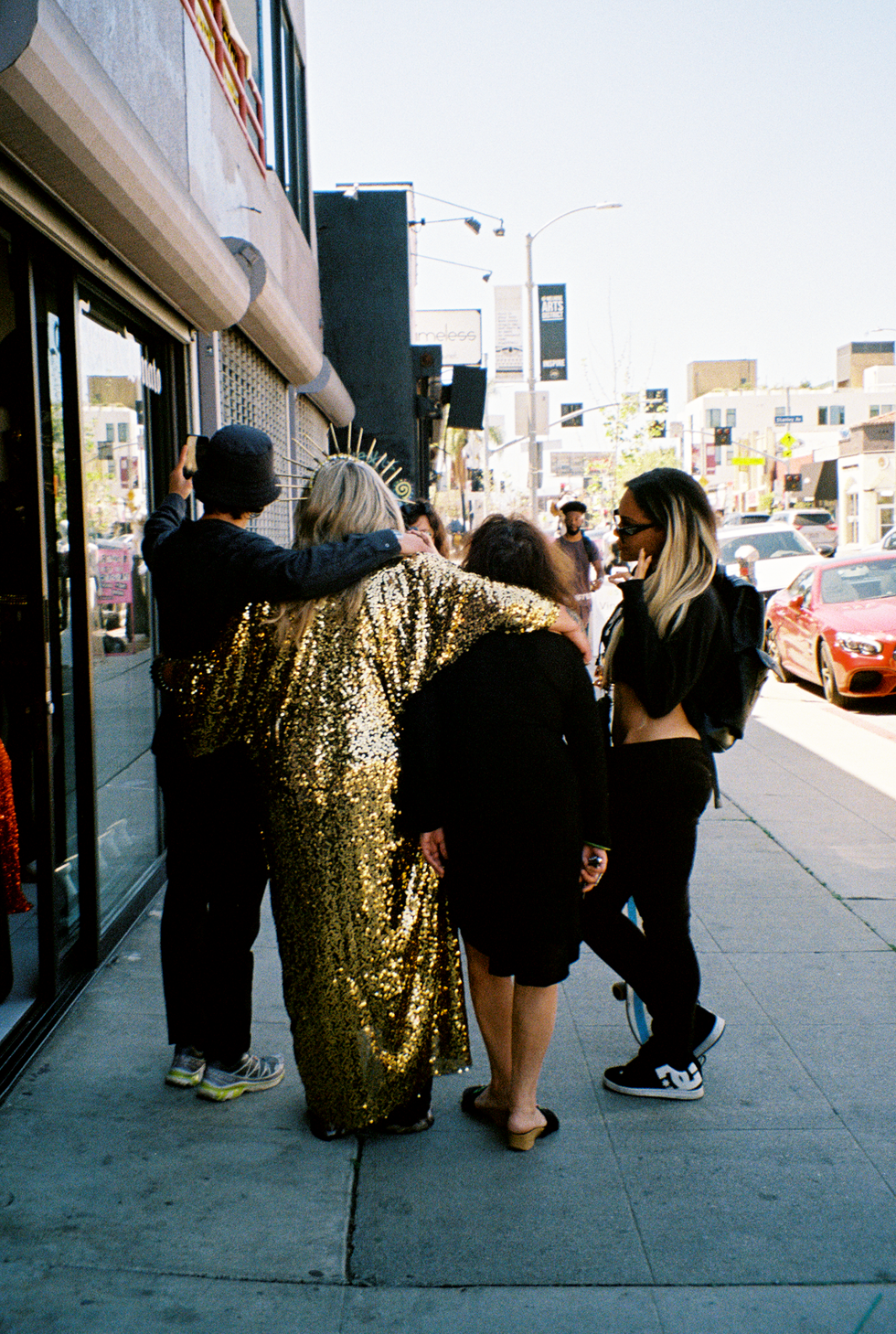
Photography: Tyler Matthew Oyer
Editor-in-chief: Justin Moran
Managing editor: Matt Wille
Editorial producer: Angelina Cantú
Story: Joan Summers
From Your Site Articles
Related Articles Around the Web
MORE ON PAPER
Entertainment
Cynthia Erivo in Full Bloom
Photography by David LaChapelle / Story by Joan Summers / Styling by Jason Bolden / Makeup by Joanna Simkim / Nails by Shea Osei
Photography by David LaChapelle / Story by Joan Summers / Styling by Jason Bolden / Makeup by Joanna Simkim / Nails by Shea Osei
01 December
Entertainment
Rami Malek Is Certifiably Unserious
Story by Joan Summers / Photography by Adam Powell
Story by Joan Summers / Photography by Adam Powell
14 November
Music
Janelle Monáe, HalloQueen
Story by Ivan Guzman / Photography by Pol Kurucz/ Styling by Alexandra Mandelkorn/ Hair by Nikki Nelms/ Makeup by Sasha Glasser/ Nails by Juan Alvear/ Set design by Krystall Schott
Story by Ivan Guzman / Photography by Pol Kurucz/ Styling by Alexandra Mandelkorn/ Hair by Nikki Nelms/ Makeup by Sasha Glasser/ Nails by Juan Alvear/ Set design by Krystall Schott
27 October
Music
You Don’t Move Cardi B
Story by Erica Campbell / Photography by Jora Frantzis / Styling by Kollin Carter/ Hair by Tokyo Stylez/ Makeup by Erika LaPearl/ Nails by Coca Nguyen/ Set design by Allegra Peyton
Story by Erica Campbell / Photography by Jora Frantzis / Styling by Kollin Carter/ Hair by Tokyo Stylez/ Makeup by Erika LaPearl/ Nails by Coca Nguyen/ Set design by Allegra Peyton
14 October
Entertainment
Matthew McConaughey Found His Rhythm
Story by Joan Summers / Photography by Greg Swales / Styling by Angelina Cantu / Grooming by Kara Yoshimoto Bua
Story by Joan Summers / Photography by Greg Swales / Styling by Angelina Cantu / Grooming by Kara Yoshimoto Bua
30 September
